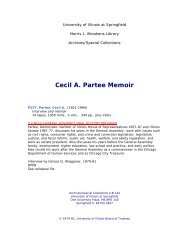Victor De Grazia Memoir - University of Illinois Springfield
Victor De Grazia Memoir - University of Illinois Springfield
Victor De Grazia Memoir - University of Illinois Springfield
Create successful ePaper yourself
Turn your PDF publications into a flip-book with our unique Google optimized e-Paper software.
A: Well, thinking it was very close. As I said before, in the last<br />
weeks, there's no way, in a close race, there's no way <strong>of</strong> knowing. Even<br />
if you're polling, because then turnout becomes important. For example,<br />
T know that in 1976 all our polls showed that Walker was ahead <strong>of</strong> Howlett<br />
and if everybody had voted, Walker would have beaten Howlett. But the<br />
fact <strong>of</strong> the matter is, if you look at what happened in the election in<br />
Chicago, the machine ground out their voters and elsewhere the Walker<br />
voters stayed home, and so you never can tell. Now, we didn't know until<br />
very late that evening that we had won for sure. I remember at one point<br />
he went on television and threatened . . . he had called Jim Thompson and<br />
he called everybody because we were worried about some <strong>of</strong> the wards not<br />
coming in with their ballots, and we were worried that they were holding<br />
back to see what was going to happen, whether or not they needed<br />
more. . . .<br />
Q: And Thompson at that time was U.S. attorney?<br />
A: U.S. attorney, yes.<br />
Q: Can you remember the moment when you finally knew that he had won the<br />
primary?<br />
A: Well, I have a very simple rule on that. When Dave Green tells me<br />
that somebody has won then I believe it and if it's at six-thirty in the<br />
evening or if it's six-thirty in the following morning, I believe him.<br />
And when he tells me we've lost then I believe we've lost. I don't<br />
remember when it was that Dave told me but it was . . . I guess it was<br />
late that evening.<br />
Q: And then what did you do? I can't believe you went home and went to<br />
bed.<br />
A: No, <strong>of</strong> course there were a lot <strong>of</strong> people down in the hotel ballroom,<br />
and Dan went down there and made a victory speech. Then we went up and<br />
had a meeting. And the meeting was to decide what should be done the<br />
next day. And everybody expected him to have a press conference the next<br />
day and we didn't want to do it, so instead he left that night for a<br />
vacation and did not have a press conference.<br />
Q:<br />
Why didn't he want to have a press conference?<br />
A: Well, there was one serious political problem. One . . . there were<br />
many, (laughs) and they all revolved around what should our relationship<br />
be with the Daley administration? But there was also another question<br />
which was . . . Hanrahan had been nominated and what should be our<br />
position toward Hanrahan? And in general we've always taken the position<br />
that . . . for example, Dan said he was against slatemaking. Not against<br />
the process <strong>of</strong> endorsement but against: the process that that was the<br />
legal determination <strong>of</strong> the candidates. Our view, and it's the legal<br />
view, is that the voters determine it in the primary. So now you're<br />
faced by a candidate you find unacceptable, who's been nominated by the<br />
people, running on your ticket. What do you do? That was a very serious<br />
problem. We wanted time to think through what we should be doing on<br />
those things, so we all flew <strong>of</strong>f, and then we met down in Florida and<br />
discussed the problem.

















